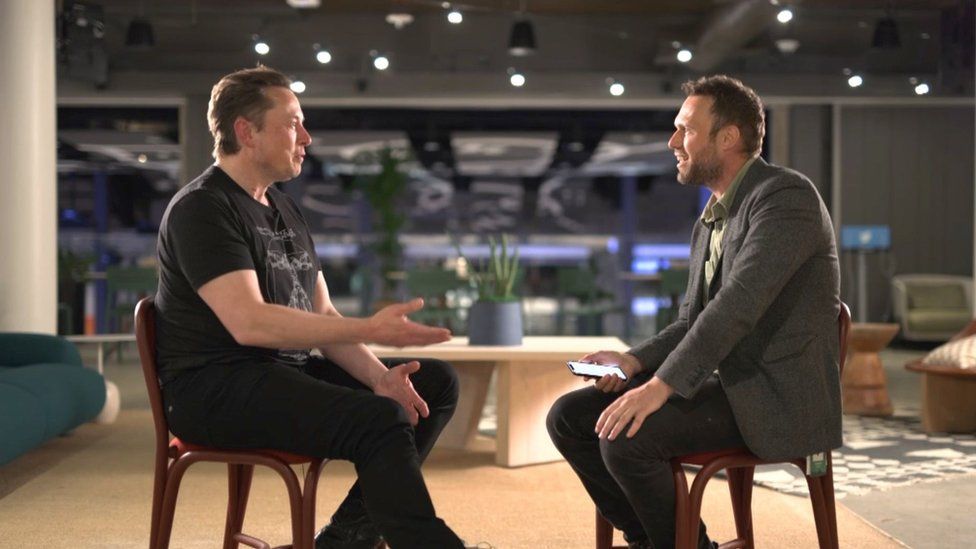Elon Musk: What it's like to interview the billionaire Twitter boss

Over the weekend I decided to drop Elon Musk an email. He'd just added a label on Twitter to a BBC account saying "government funded media". I thought I'd send him a link to how the BBC is funded – predominantly through the licence fee.
"Is the Twitter label accurate?" was the response I got which came from Mr Musk, rather than a media team.
My editor suggested I have a bash at asking for an interview. Why not have a go, we thought.
On Tuesday lunchtime I typed an email, requesting a chat about his first six months as Twitter boss. To my surprise, he responded.
"Sure, how about tonight?" he said.
I wasn't totally sure if he was being serious. I prepped for the interview, hoping it would happen – but wondering if it actually would.
The curveball came just before the interview – when Elon Musk's team insisted the interview should be live on Twitter Spaces.
We responded saying if Twitter Spaces was going to be live, then we'll put it on the BBC channel too. "Cool," he said.
According to his team, more than 3 million people logged in to listen on Twitter Spaces.
- AMERICAST: Elon Musk Speaks to the BBC
Straight off the bat, it was clear he was going to answer my questions.
"Did you buy Twitter because a court was going to force you to?" I asked.
He replied: "Yeah, yeah I did". It was a startlingly frank answer – which set the tone for the interview.
A court may have forced Mr Musk to buy Twitter, because he made an offer for the social media platform then backed out of the deal.
The previous owners and Elon Musk were set to face off in court but before that happened, the billionaire made a surprise U-Turn and bought the platform.
It's the first time Mr Musk has admitted that, even when he walked into Twitter with that sink – all in smiles – he didn't really want it to happen. He'd rather have not bought the company.
Since he has taken over Twitter, he has laid off large swathes of his workforce and made what many see as unorthodox business decisions including introducing paid-for-verification. Many also say Twitter has become a more dangerous platform for users without enough appropriate moderation.
The billionaire loves chaos and messing with the media. Several times it felt like he was trying to interview me.
Asking him whether Twitter had become a more hateful place, Mr Musk pushed me to try and name specific examples I'd seen. He was enjoying it at this point.
The BBC has previously documented that misinformation is a problem on the platform, yet Mr Musk disagreed.
I pointed out that you can't have it both ways – a platform that allows people to post what they wish without being censored, surely also disseminates misinformation?
But Mr Musk claimed reducing bots, which he says he is doing, will reduce misinformation. This felt like his weakest answer.
Watch: Elon Musk's unexpected BBC interview… in 90 seconds
We covered all sorts of subjects: from misinformation and the challenges of artificial intelligence to his love life and whether it was lonely to be a billionaire. He told me he'd often be swarmed by men at parties talking about projects – and that it was hard to trust people.
His answers were also, at times, absurd.
In one moment he told me his dog runs the company.
While he wriggled out of some questions, there were many questions he took the time to consider.
For example, when I asked him whether he believed TikTok should be banned. He told me that while that would be good for Twitter – one less competitor – he was generally against banning things.
I was expecting at the end of the interview for him to leave as I asked him for "one more question", but he did nothing of the sort.
The interview, initially slated to be 30 minutes, ended up running for about 90 minutes.
At the end he said his goodbyes and went to his office to work. "I usually go to sleep between 3am and 6am," he said.
As he disappeared we reflected on a whirlwind of an interview – and how none of this would have happened if I hadn't sent that email.
Related Topics
-
-
9 hours ago
-
